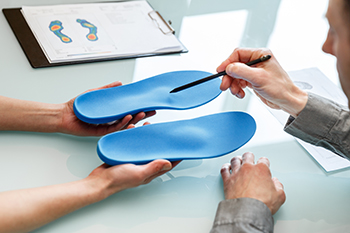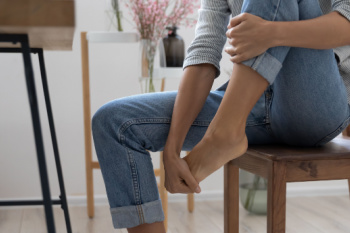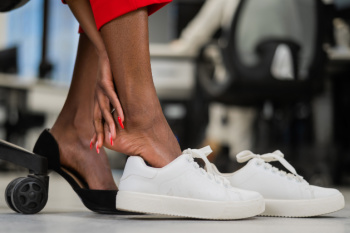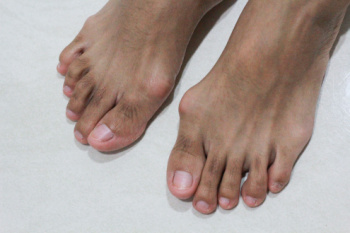Items filtered by date: August 2024
Variety of Orthotics

Orthotics are shoe inserts that support and align the foot, helping to address various conditions like flat feet, plantar fasciitis, or overpronation. They are made from various materials, including plastic, foam, and carbon fiber, which offer different levels of support and flexibility. Soft orthotics provide cushioning and are ideal for relieving pressure on sore spots, while rigid orthotics offer more structural support, beneficial for controlling motion in the joints. Semi-rigid orthotics strike a balance between comfort and support, making them versatile for various activities. Athletic shoes often come equipped with built-in arch supports and heel cups to enhance comfort and performance. These features help distribute pressure evenly across the foot, reduce strain on the arches, and stabilize the heel during movement. Whether you need extra support for a specific condition or enhanced comfort during exercise, it is suggested that you schedule an appointment with a podiatrist to see if orthotics can help you.
If you are having discomfort in your feet and would like to try orthotics, contact one of our podiatrists from Foot Care Centers of Palm Beach. Our doctors can provide the care you need to keep you pain-free and on your feet.
What Are Orthotics?
Orthotics are inserts you can place into your shoes to help with a variety of foot problems such as flat feet or foot pain. Orthotics provide relief and comfort for minor foot and heel pain but can’t correct serious biomechanical problems in your feet.
Over-the-Counter Inserts
Orthotics come in a wide variety of over-the-counter inserts that are used to treat foot pain, heel pain, and minor problems. For example, arch supports can be inserted into your shoes to help correct overarched or flat feet, while gel insoles are often used because they provide comfort and relief from foot and heel pain by alleviating pressure.
Prescription Orthotics
If over-the-counter inserts don’t work for you or if you have a more severe foot concern, it is possible to have your podiatrist prescribe custom orthotics. These high-quality inserts are designed to treat problems such as abnormal motion, plantar fasciitis, and severe forms of heel pain. They can even be used to help patients suffering from diabetes by treating foot ulcers and painful calluses and are usually molded to your feet individually, which allows them to provide full support and comfort.
If you are experiencing minor to severe foot or heel pain, it’s recommended to speak with your podiatrist about the possibilities of using orthotics. A podiatrist can determine which type of orthotic is right for you and allow you to take the first steps towards being pain-free.
If you have any questions please contact our office located in Boynton Beach, FL . We offer the newest diagnostic and treatment technologies for all your foot and ankle needs.
Definition and Impact of a Stubbed Toe

A stubbed toe occurs when the toe forcefully contacts a hard surface, often causing sudden pain and discomfort. This common injury typically happens when the toe collides with furniture, a door frame, or any other solid object. The impact can lead to immediate swelling, bruising, and sometimes a visible injury such as a cut or scrape. While a stubbed toe is usually not severe, it can cause significant pain and difficulty walking. In some cases, the trauma might lead to a fracture or dislocation, which requires medical attention. To manage a stubbed toe, keeping the foot elevated assists in minimizing inflammation. Proper rest and avoiding pressure on the affected toe are essential for a swift recovery. If you have stubbed your toe and it is causing extreme or persistent pain, it is suggested that you promptly consult a podiatrist who can perform an accurate diagnosis to rule out a toe fracture.
Foot Pain
Foot pain can be extremely painful and debilitating. If you have a foot pain, consult with one of our podiatrists from Foot Care Centers of Palm Beach. Our doctors will assess your condition and provide you with quality foot and ankle treatment.
Causes
Foot pain is a very broad condition that could be caused by one or more ailments. The most common include:
- Bunions
- Hammertoes
- Plantar Fasciitis
- Bone Spurs
- Corns
- Tarsal Tunnel Syndrome
- Ingrown Toenails
- Arthritis (such as Gout, Rheumatoid, and Osteoarthritis)
- Flat Feet
- Injury (from stress fractures, broken toe, foot, ankle, Achilles tendon ruptures, and sprains)
- And more
Diagnosis
To figure out the cause of foot pain, podiatrists utilize several different methods. This can range from simple visual inspections and sensation tests to X-rays and MRI scans. Prior medical history, family medical history, and any recent physical traumatic events will all be taken into consideration for a proper diagnosis.
Treatment
Treatment depends upon the cause of the foot pain. Whether it is resting, staying off the foot, or having surgery; podiatrists have a number of treatment options available for foot pain.
If you have any questions, please feel free to contact our office located in Boynton Beach, FL . We offer the newest diagnostic and treatment technologies for all your foot care needs.
Do You Suffer From Painful Feet?
What to Do About Heel Pain
 Heel pain is often caused by plantar fasciitis, an inflammation of the tissue running along the bottom of the foot. Other causes include Achilles tendinitis, heel spurs, or repetitive stress injuries. Contributing factors for heel pain can be excessive walking or standing, wearing improper footwear, obesity, or flat feet. To manage heel pain, rest and avoid activities that aggravate the condition. Performing stretching exercises and using supportive footwear or orthotic inserts can provide relief. Mild pain relievers may help reduce inflammation and pain. If you have heel pain and symptoms persist, it is suggested that you consult a podiatrist for a thorough evaluation and treatment plan.
Heel pain is often caused by plantar fasciitis, an inflammation of the tissue running along the bottom of the foot. Other causes include Achilles tendinitis, heel spurs, or repetitive stress injuries. Contributing factors for heel pain can be excessive walking or standing, wearing improper footwear, obesity, or flat feet. To manage heel pain, rest and avoid activities that aggravate the condition. Performing stretching exercises and using supportive footwear or orthotic inserts can provide relief. Mild pain relievers may help reduce inflammation and pain. If you have heel pain and symptoms persist, it is suggested that you consult a podiatrist for a thorough evaluation and treatment plan.
Many people suffer from bouts of heel pain. For more information, contact one of our podiatrists of Foot Care Centers of Palm Beach. Our doctors can provide the care you need to keep you pain-free and on your feet.
Causes of Heel Pain
Heel pain is often associated with plantar fasciitis. The plantar fascia is a band of tissues that extends along the bottom of the foot. A rip or tear in this ligament can cause inflammation of the tissue.
Achilles tendonitis is another cause of heel pain. Inflammation of the Achilles tendon will cause pain from fractures and muscle tearing. Lack of flexibility is also another symptom.
Heel spurs are another cause of pain. When the tissues of the plantar fascia undergo a great deal of stress, it can lead to ligament separation from the heel bone, causing heel spurs.
Why Might Heel Pain Occur?
- Wearing ill-fitting shoes
- Wearing non-supportive shoes
- Weight change
- Excessive running
Treatments
Heel pain should be treated as soon as possible for immediate results. Keeping your feet in a stress-free environment will help. If you suffer from Achilles tendonitis or plantar fasciitis, applying ice will reduce the swelling. Stretching before an exercise like running will help the muscles. Using all these tips will help make heel pain a condition of the past.
If you have any questions please contact our office located in Boynton Beach, FL . We offer the newest diagnostic and treatment technologies for all your foot and ankle needs.
Bunion Deformities
 A bunion, medically known as hallux valgus, is a deformity characterized by the misalignment of the big toe joint, causing the toe to lean toward the other toes and creating a noticeable bump on the side of the foot. This condition often results from a genetic predisposition, wearing tight or ill-fitting shoes, high heels, or conditions such as arthritis. Symptoms of a bunion can include pain, swelling, redness surrounding the affected joint, and difficulty walking. Over time, the deformity can worsen, leading to increased discomfort and mobility issues. Conservative treatments for bunions include wearing wide-toed shoes, using protective pads to reduce friction, wearing orthotics, and taking mild pain relievers. If conservative methods fail to provide relief, more invasive options can include corticosteroid injections to reduce inflammation or bunionectomy surgery to realign the bones, tendons, and ligaments. If you have a painful bunion, it is suggested that you schedule an appointment with a podiatrist for an accurate diagnosis and a personalized treatment plan.
A bunion, medically known as hallux valgus, is a deformity characterized by the misalignment of the big toe joint, causing the toe to lean toward the other toes and creating a noticeable bump on the side of the foot. This condition often results from a genetic predisposition, wearing tight or ill-fitting shoes, high heels, or conditions such as arthritis. Symptoms of a bunion can include pain, swelling, redness surrounding the affected joint, and difficulty walking. Over time, the deformity can worsen, leading to increased discomfort and mobility issues. Conservative treatments for bunions include wearing wide-toed shoes, using protective pads to reduce friction, wearing orthotics, and taking mild pain relievers. If conservative methods fail to provide relief, more invasive options can include corticosteroid injections to reduce inflammation or bunionectomy surgery to realign the bones, tendons, and ligaments. If you have a painful bunion, it is suggested that you schedule an appointment with a podiatrist for an accurate diagnosis and a personalized treatment plan.
If you are suffering from bunion pain, contact one of our podiatrists of Foot Care Centers of Palm Beach. Our doctors can provide the care you need to keep you pain-free and on your feet.
What Is a Bunion?
Bunions are painful bony bumps that usually develop on the inside of the foot at the joint of the big toe. As the deformity increases over time, it may become painful to walk and wear shoes. Women are more likely to exacerbate existing bunions since they often wear tight, narrow shoes that shift their toes together. Bunion pain can be relieved by wearing wider shoes with enough room for the toes.
Causes
- Genetics – some people inherit feet that are more prone to bunion development
- Inflammatory Conditions - rheumatoid arthritis and polio may cause bunion development
Symptoms
- Redness and inflammation
- Pain and tenderness
- Callus or corns on the bump
- Restricted motion in the big toe
In order to diagnose your bunion, your podiatrist may ask about your medical history, symptoms, and general health. Your doctor might also order an x-ray to take a closer look at your feet. Nonsurgical treatment options include orthotics, padding, icing, changes in footwear, and medication. If nonsurgical treatments don’t alleviate your bunion pain, surgery may be necessary.
If you have any questions, please feel free to contact our office located in Boynton Beach, FL . We offer the newest diagnostic and treatment technologies for all your foot care needs.

